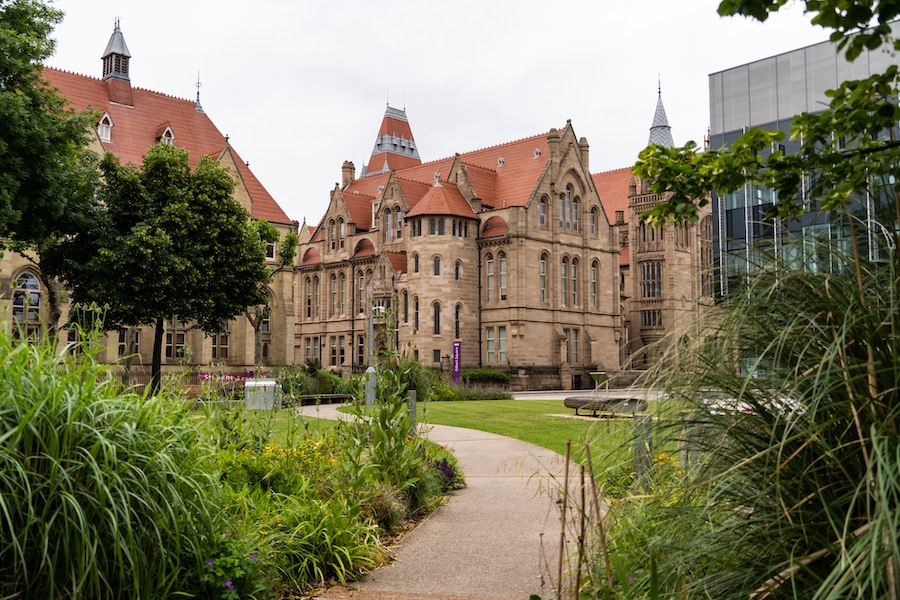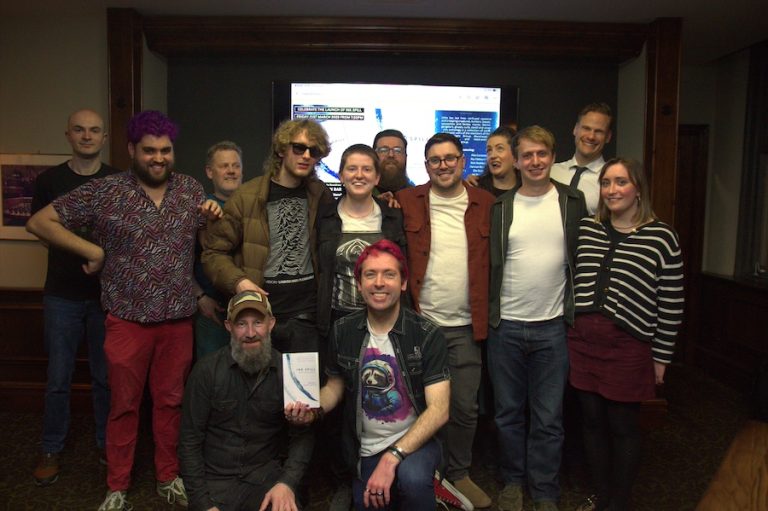The 25 Nobel Prize winning Manchester University marvels who changed the world as we know it
- Written by Thom Bamford
- Last updated 1 year ago
- Cornerstone, Featured, History

Manchester University Nobel Prize winners – there are certainly plenty of them.
The Nobel Prize, an emblem of unparalleled achievement and intellectual prowess, showcases the contributions of exceptional minds to humanity’s collective knowledge.
Instituted by inventor Alfred Nobel in 1895, these prestigious accolades honour outstanding individuals who have made groundbreaking strides in physics, chemistry, physiology or medicine, literature, peace, and economic sciences.
Incredibly, Manchester University has produced TWENTY FIVE Nobel laureates.
But why Manchester?
What alchemical combination of intellect, innovation, and inspiration has propelled so many from this city into the echelons of Nobel recognition?
Join us on a journey through the corridors of discovery as we unravel the tales of Manchester’s brilliant minds, exploring the unique environment and academic fervour that has fostered a legacy of excellence in science, economics, and beyond.
Manchester University Nobel Prize winners
1. Joseph John Thomson (1906 Nobel Prize in Physics)
Joseph John Thomson, a Manchester native, made groundbreaking contributions to the study of electrical discharges in gases. His work on cathode rays in electrified gases revealed the existence of ‘negative corpuscles,’ later known as electrons. Thomson’s imaginative research at The University of Manchester’s Cavendish Laboratory laid the foundation for the understanding of atomic structure, inspiring future Nobel laureates such as Ernest Rutherford.
2. Ernest Rutherford (1908 Nobel Prize in Chemistry)
New Zealand-born Ernest Rutherford, mentored by Thomson, conducted pioneering research at Manchester’s Langworthy Professor of Physics. His collaboration with chemist Frederick Soddy unveiled the decay rates of radioactive substances, earning him the 1908 Nobel Prize in Chemistry. Rutherford’s Manchester laboratory became a global centre for atomic physics experiments, leading to significant discoveries in atomic structure.
3. William Lawrence Bragg (1915 Nobel Prize in Physics)
At the age of 25, Lawrence Bragg, while still a research student, formulated the law for calculating atomic positions in crystals using X-ray diffraction. In 1915, he became the youngest Nobel laureate in Physics, jointly awarded with his father, William Henry Bragg. Bragg later succeeded Rutherford as Langworthy Professor at Manchester, establishing a vital crystallography research program.
4. Niels Bohr (1922 Nobel Prize in Physics)
Danish physicist Niels Bohr, a key figure in atomic theory, won the 1922 Nobel Prize for his investigations into atomic structure and radiation. Bohr’s collaboration with Rutherford at Manchester in 1912 mathematically systematised the nuclear model of the atom. His pioneering work laid the foundation for our understanding of electrons’ defined orbits around the atomic nucleus.
5. Archibald Vivian Hill (1922 Nobel Prize in Physiology or Medicine)
Physiologist AV Hill, awarded the 1922 Nobel Prize in Physiology or Medicine, contributed significantly to understanding heat production and muscle mechanics. Hill, who became Brackenbury Professor of Physiology at Manchester in 1920, led the development of biophysics and made crucial measurements during muscle contractions. His work extended to politics, aiding the resettlement of Jewish scientists from Nazi Germany.
6. CTR Wilson (1927 Nobel Prize in Physics)
Scottish physicist CTR Wilson received the 1927 Nobel Prize for creating the cloud chamber, a groundbreaking particle detector. Born in Glencorse and educated at Owens College (now Manchester), Wilson’s cloud chamber allowed the visualisation of charged particle pathways, earning praise from Rutherford as the “most original and wonderful instrument in scientific history.”
7. Arthur Harden (1929 Nobel Prize in Chemistry)
Manchester-born Arthur Harden shared the 1929 Nobel Prize in Chemistry for his studies on sugar fermentation by yeast extracts. A lecturer at Manchester, Harden’s biochemical research at the Lister Institute established the stages of sugar conversion to alcohol and emphasised the role of phosphorus compounds in the process.
8. James Chadwick (1935 Nobel Prize in Physics)
Manchester-educated James Chadwick received the 1935 Nobel Prize in Physics for discovering the neutron, an uncharged particle in atomic nuclei. Chadwick’s collaboration with Rutherford at Manchester and subsequent work at the Cavendish Laboratory in Cambridge paved the way for advancements in atomic and nuclear physics.
9. Walter Norman Haworth (1937 Nobel Prize in Chemistry)
Carbohydrate chemist Norman Haworth, awarded the 1937 Nobel Prize, created a significant school of research at Birmingham. His work on the chemical structures of sugars and the synthesis of vitamin C, undertaken after his education at Manchester, laid the groundwork for large-scale vitamin production.
10. George de Hevesy (1943 Nobel Prize in Chemistry)
Hungarian chemist George de Hevesy received the 1943 Nobel Prize for pioneering the use of radioactive isotopes as tracers in chemical processes. Working with Rutherford at Manchester, de Hevesy realized the potential of isotopes while sipping tea with Niels Bohr, leading to groundbreaking research in radiochemistry.
11. Robert Robinson (1947 Nobel Prize in Chemistry)
Chemist Robert Robinson, a former Professor of Organic Chemistry at Manchester, was awarded the 1947 Nobel Prize for his work on the structure of plant products, including alkaloids. Robinson’s analytical methods played a crucial role in identifying components in complex biological molecules.
12. Patrick Maynard Stuart Blackett (1948 Nobel Prize in Physics)
Physicist Patrick Blackett received the 1948 Nobel Prize for his pioneering work in atomic physics. Using CTR Wilson’s cloud chamber at Manchester, Blackett automated the process to photograph the tracks of atomic nucleus disintegration, contributing to the understanding of positrons and gamma rays.
13. John Douglas Cockcroft (1951 Nobel Prize in Physics)
Physicist John Cockcroft, a Manchester alum, shared the 1951 Nobel Prize for creating the first proton accelerator at Cambridge. Cockcroft’s groundbreaking research on nuclear transformations laid the foundation for new isotopes, contributing to advancements in atomic physics.
14. Alexander Todd (1957 Nobel Prize in Chemistry)
Chemist Alexander Todd, Professor of Organic Chemistry at Manchester, won the 1957 Nobel Prize for his analysis of biologically important molecules. Todd’s work on nucleotides, crucial components of DNA, played a pivotal role in the development of the double helix model by Watson and Crick.
15. Melvin Calvin (1961 Nobel Prize in Chemistry)
Chemist Melvin Calvin, a former Manchester researcher, received the 1961 Nobel Prize for studying the pathways of photosynthesis in plants. Calvin’s use of radioisotopes, particularly carbon-14, provided crucial insights into the complex mechanisms of converting carbon dioxide into carbohydrates.
16. Hans Albrecht Bethe (1967 Nobel Prize in Physics)
Physicist Hans Bethe, briefly associated with Manchester, received the 1967 Nobel Prize for his research on nuclear reactions in stars. Bethe’s contributions to understanding the energy levels of hydrogen atoms and the ‘many-body problem’ in atomic nuclei were foundational in astrophysics.
17. John Richard Hicks (1972 Nobel Prize in Economic Sciences)
Economist John Hicks, a former Professor of Political Economy at Manchester, shared the 1972 Nobel Prize for his work on general equilibrium theory and welfare economics. Hicks’ conceptual tools became essential for analyzing price mechanisms, technical change, and money demand.
18. Nevill Francis Mott (1977 Nobel Prize in Physics)
Physicist Nevill Mott, who worked at Manchester, shared the 1977 Nobel Prize for his theoretical investigations of the electronic structure of magnetic and disordered systems. Mott’s contributions to nuclear and collision theory significantly impacted the understanding of materials.
19. Arthur Lewis (1979 Nobel Prize in Economic Sciences)
Economist Arthur Lewis, the first black laureate in a category other than Peace, received the 1979 Nobel Prize for his work on development economics. Lewis, a professor at Manchester, emphasized historical context in understanding development, and integrating political, social, and cultural factors.
20. John Charles Polanyi (1986 Nobel Prize in Chemistry)
Chemist John Polanyi, born in Berlin and raised in Manchester, received the 1986 Nobel Prize for his contributions to the study of chemical reactions’ mechanics. Polanyi’s work on measuring weak infrared emissions from newly formed molecules played a pivotal role in advancing chemical understanding.
21. Michael Smith (1993 Nobel Prize in Chemistry)
Chemist Michael Smith, a Manchester scholarship recipient, shared the 1993 Nobel Prize for his groundbreaking work on site-directed mutagenesis. Smith’s discovery of synthetic DNA’s ability to bind with virus DNA opened avenues for engineering DNA and exploring medical applications.
22. Joseph E Stiglitz (2001 Nobel Prize in Economic Sciences)
Economist Joseph Stiglitz received the 2001 Nobel Prize for his contributions to the economics of information. Stiglitz’s work focused on monetary transactions where one party possesses more information than the other, shedding light on market dysfunctions and advocating for state intervention.
23. John Sulston (2002 Nobel Prize in Physiology or Medicine)
Biologist John Sulston shared the 2002 Nobel Prize for his research on genetic regulation in tissue and organ development. Sulston’s meticulous observations of nematode worm cell lineages and subsequent work on the Human Genome Project marked significant contributions to genomics.
24. Andre Geim (2010 Nobel Prize in Physics)
Physicist Andre Geim, awarded the 2010 Nobel Prize, played a crucial role in preparing and characterising individual atomic planes of carbon known as graphene. Geim’s innovative approach, including using Sellotape to extract graphene, opened new possibilities in electronics and composite materials.
25. Konstantin Novoselov (2010 Nobel Prize in Physics)
Physicist Kostya Novoselov, alongside Geim, shared the 2010 Nobel Prize for their work on graphene. Novoselov’s contributions in isolating and understanding the properties of graphene, with its remarkable strength and conductivity, held significant implications for various technological applications.
The remarkable legacy of Nobel laureates from Manchester University shows the city’s commitment to intellectual excellence, scientific innovation, and academic prowess.
With a dazzling array of minds contributing groundbreaking insights across disciplines, from physics and chemistry to physiology, economics, and beyond, Manchester has established itself as one of the best Unis in the UK.
From Joseph John Thomson’s groundbreaking discoveries in electrical discharges to Andre Geim and Konstantin Novoselov’s pioneering work on graphene, each laureate has left a mark on the world.
Manchester University Nobel Prize winners – a story made in heaven.
As Manchester remains a crucible for intellectual alchemy, the city’s legacy in the awards of Nobel recognition invites us to contemplate the combination of intellect, innovation, and inspiration that has propelled so many brilliant minds from this city onto the world stage.
find out more about Manchester University Nobel Prize winners by clicking here
- This article was last updated 1 year ago.
- It was first published on 8 December 2023 and is subject to be updated from time to time. Please refresh or return to see the latest version.
Did we miss something? Let us know: press@ilovemanchester.com
Want to be the first to receive all the latest news stories, what’s on and events from the heart of Manchester? Sign up here.
Manchester is a successful city, but many people suffer. I Love Manchester helps raise awareness and funds to help improve the lives and prospects of people across Greater Manchester – and we can’t do it without your help. So please support us with what you can so we can continue to spread the love. Thank you in advance!
An email you’ll love. Subscribe to our newsletter to get the latest news stories delivered direct to your inbox.
Got a story worth sharing?
What’s the story? We are all ears when it comes to positive news and inspiring stories. You can send story ideas to press@ilovemanchester.com
While we can’t guarantee to publish everything, we will always consider any enquiry or idea that promotes:
- Independent new openings
- Human interest
- Not-for-profit organisations
- Community Interest Companies (CiCs) and projects
- Charities and charitable initiatives
- Affordability and offers saving people over 20%
For anything else, don’t hesitate to get in touch with us about advertorials (from £350+VAT) and advertising opportunities: advertise@ilovemanchester.com



The eclectic group that’s been helping writers cut their teeth for 50 years

Manchester and Los Angeles prove that opposites really do attract

“His presence will be deeply missed” Children’s hospice bids farewell to their visionary CEO

















